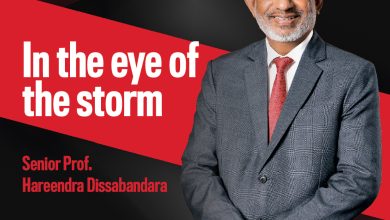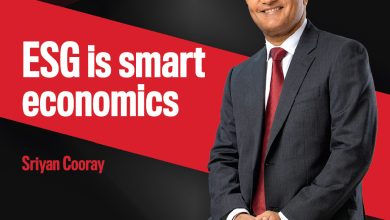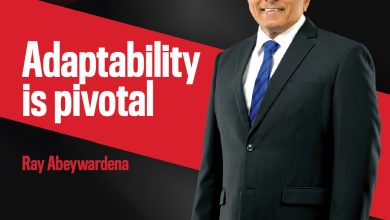NATIONAL PERSPECTIVE
Business-nation nexus
Jehan Perinpanayagam

As Sri Lanka works to rebuild its economy in the aftermath of the economic crisis, the role of the private sector has never been more critical. And Jehan Perinpanayagam posits that the relationship between corporate success and national progress is both intrinsic and inseparable.
At the heart of his philosophy is a belief that values driven action and national engagement not only build a stronger country, but also shape how a company is viewed within the business community and beyond.
“It’s important to prioritise actions that align with an organisation’s core values. Whether through environmental, social and corporate governance (ESG) initiatives, diversity and inclusion programmes or community outreach, the guiding principle is to do the right thing,” says Perinpanayagam.
In his view, participating in national economic development is not only a responsibility; it also a strategic imperative, especially for large corporates with the capacity to influence meaningful change. “As Sri Lanka recovers, we have the standing and ability to contribute positively – and we must,” he says.
Perinpanayagam acknowledges that this sense of national duty is increasingly shared across Sri Lanka’s business ecosystem. He asserts that businesses engaged in national progress are often perceived more favourably by investors, employees and consumers alike.
“Today’s youth want to work for purpose driven organisations. Research shows that a majority of investors and customers prefer companies that are responsible and values led,” he adds.
For organisations, this is a clear case of doing well by doing good – a win-win where corporate values align with national imperatives.
NATION BUILDERS Perinpanayagam believes that respected businesses cannot simply operate within a country; they must work with it.
“We’re seeing more global examples of companies that don’t merely pursue profit but lead social and technological change; whether it’s sustainability, lifesaving innovations or tech for good initiatives,” he notes.
The economic crisis made it clear that passivity is not an option. As Perinpanayagam notes, “here is a realisation across the corporate sector that we needed to get involved to shape policy, advocate for sustainable governance and engage constructively.”
Larger corporates in particular have a vested interest in national stability, as their own success is closely tied to macroeconomic policies and the economic health of the country.
COLLECTIVE IMPACT The importance of aligning organisational goals with national development objectives is a recurring theme in Perinpanayagam’s leadership ethos. “A company cannot exist in isolation. Its survival and growth are tied to the country,” he explains.
He points to Sri Lanka’s IT-BPM sector as a prime example of alignment in action. It is collectively working towards a shared goal of becoming a US$ 5 billion sector with companies uniting behind a common vision.
The tourism industry, he notes, is following a similar trajectory. Companies that lead these aligned efforts naturally emerge as industry role models – organisations that are seen as responsible, pragmatic and future facing.
“These companies share their knowledge, advocate for the common good and help shape the future of their industries. This kind of alignment enhances both national progress and corporate reputation,” he adds.
CIVIC LEADERSHIP According to Perinpanayagam, every business has the capacity to contribute to national and industry level development.
“Get involved in your industry association, participate in chamber activities, and volunteer your time and expertise. But this must go beyond identifying challenges; it must focus on finding solutions. Be constructive. Don’t just talk about what’s wrong, bring ideas and energy to the table,” he urges.
He also highlights the power of storytelling in shaping perception. “We must all be ambassadors for Sri Lanka. Share the successes, the positive stories and the potential – not merely the problems.”
In doing so, Perinpanayagam believes organisations can elevate not only their own reputation but the standing of the nation as a whole.





